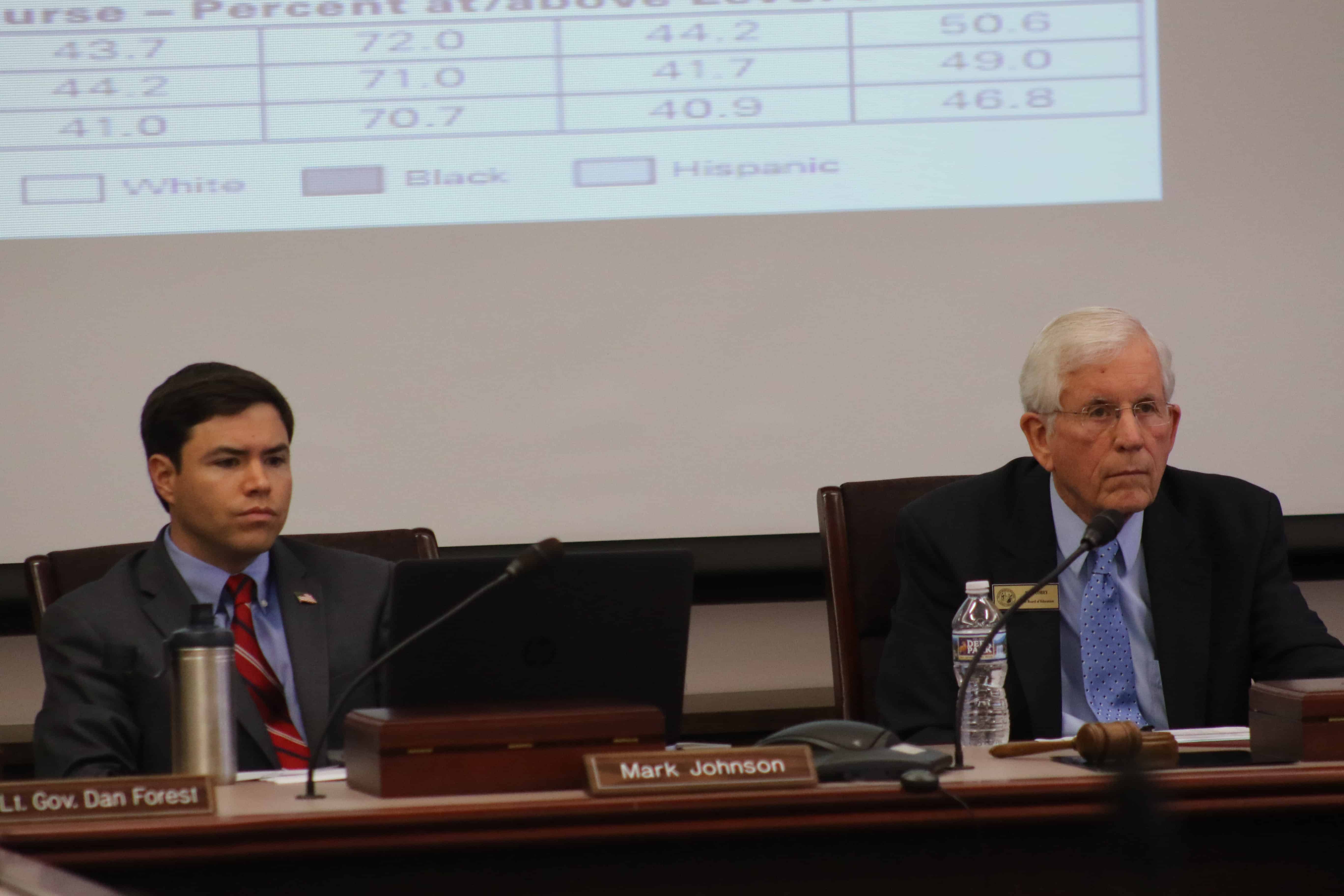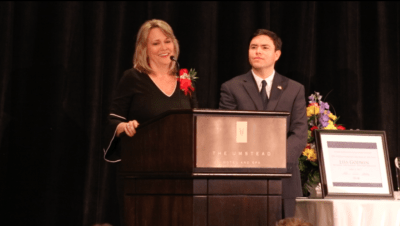The State Board of Education met Wednesday and Thursday, first discussing and then reporting out and voting on measures to improve reading standards, grant restart status to low-performing schools, and implement a standardized school mental health policy.
Reading standards
In an 8-4 vote, the State Board approved new English/language arts standards.
Many members —including those who ended up voting for and against the standards — were concerned that the revisions would bring back controversy that has surrounded Common Core standards for years.
Superintendent of Public Instruction Mark Johnson suggested creating a subcommittee within the Board to choose a group of outside professionals with different perspectives to review the standards.
Vice Chairman A.L. Collins voted for the standards because he said he believes they are an improvement, but stressed that he thinks Johnson’s idea is a good one and that hearing from concerned entities before implementation is critical.
“I don’t know what we’re afraid of,” Collins said. “I think they need to be peer-reviewed. I think we need to listen to what people are saying.”
Board member Olivia Oxendine stressed that there needed to be a clear definition of what standard is provided to teachers. The standards are not meant to tell teachers what to teach, but set guides as to what students need to know how to do.
Collins said, with previous standards, he’s seen issues with teachers not having the support they need to understand them or know how to help students reach them.
“I believe that some of the lack of success we’re seeing across the curriculum is related as much to our teachers not understanding the standards and getting the resources to implement them as to the quality of a particular standard that’s out there,” Collins said.
Eric Davis, who heads the Board’s student learning and achievement committee, defended the process of creating the new standards, saying it included months of input where stakeholders could voice concerns.
“This process shows that not only have we invited but we’ve engaged thousands of people to work with us on revising these standards,” Davis said. “We’ve been, in my view, incredibly open and inviting and transparent about how to improve these standards.”
Julie Joslin, the Department of Public Instruction’s chief of the English/language arts section, said 284 of 463 standards were revised, including a new format that makes the document easier to understand for teachers and an added glossary for clarification. The complete writing process is emphasized more than it was in previous standards, she said, and language continuums are more developed from year to year. Joslin said Reading Standard 10 has been changed to include independent reading and “connecting experiences to text.”
Joslin said more than 10,000 stakeholders were involved in the two-year process of drafting, receiving input, and developing standards. A public comment period from January 9th to the 30th had 985 respondents, of which 92 percent were educators, that helped shape the current draft, along with previous time frames for feedback from school districts, administrators, and community members.
“We are confident that these new standards offer a compass for strong teaching and learning in N.C.,” she said, adding that they flow from year to year and provide flexibility to teachers on how to meet the needs of students.
Restarts
Sixteen public schools were granted “restart” statuses by the Board on Thursday. The status allows schools to operate with charter-like flexibility in areas like funding, curriculum, and calendar.
The restart model is one of four statuses for which “continually low-performing” schools can apply; the other three are transformation, turn-around, and closure. To be deemed “continually low-performing,” schools must have received a D or F on the A-F school performance grading scale and not exceeded growth expectations for two of the last three years.
Nancy Barbour, DPI’s director of district and school transformation, said the program has reached its 50th application mark. The opportunity is one many schools across the state are noticing and using.
Board Chairman Bill Cobey said he is proud of the momentum behind the opportunity.
“This is one of the most encouraging movements that I have seen,” Cobey said.
Barbour said her department is reviewing 29 other applications, 27 of which are applying for the restart model. The other two are the first to apply for the transformation model and both come from Elizabeth City-Pasquotank County Schools. Those will be brought back next month for action. Barbour said the applications look promising.
“In the meantime, we’ll reach out to these school systems if there is anything that’s missing or incomplete,” Barbour said. “But at first glance, they all look really good.”
Mental health policy
The State Board approved a policy that requires school districts to create plans for how to address students’ mental health needs, including strategies for prevention, early intervention, and referral, treatment, and re-entry.
“Each local education agency (LEA)/charter school shall develop and implement a plan for assessing and improving upon the effectiveness of existing supports for the mental health and substance abuse needs of its student population,” the policy reads. Under the policy, the districts’ and charter schools’ plans have to be reviewed every three years.
Bill Hussey, DPI’s director of exceptional children, said he’s worked with the North Carolina School Boards Association and the Charter School Association to make sure the policy works for everyone.
The policy requires schools’ staff to be trained on how to support students’ mental health and identify problems as they arise. Hussey said there were changes made to the training aspect of the policy so that teachers do not miss much instructional time and schools are not burdened with costs.
Hussey said they also removed the training requirement to only staff members who have direct contact with students daily.
All Board members approved of the plan except N.C. State Treasurer Dale Folwell who took issue with quick timeline of the policy. The local school districts’ own plans and the planning of the DPI-backed training is set to commence in the 2017-18 school year. In 2018-19, those plans will be implemented. Charter schools will not start their planning until 2018-19 and their implementation until 2019-20.
“If I vote no, it’s not because of my heart,” Folwell said. “It’s because my mind’s not quit there yet.”
During a presentation to the Board in February, Hussey explained the motivation behind the policy which started with research from a group of public educators, families, mental health clinicians, and advocates called The North Carolina School Mental Health Initiative.
The group’s study found that 19 percent of the state’s students 8 to15 years old — compared to 13.1 percent nationwide — have some kind of mental health or substance use disorder. Seventy-five percent of those students, the initiative reported, aren’t receiving treatment from the state.
“It really is about the fact that we don’t have enough services,” Hussey said.



